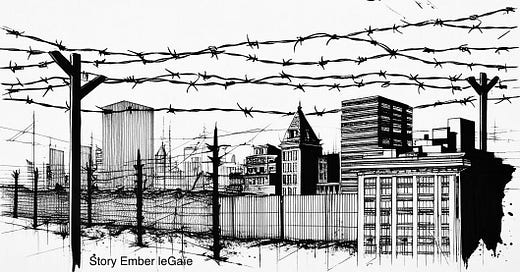Open Letter: On the Theft of Names and the Erasure of Palestinian Genocide
To Asim—and to anyone else insisting Palestinians must perform their annihilation in borrowed grief:
You said genocide wasn’t enough.
You said the word was too clinical, too legal, too insufficient.
And then you called it a Holocaust.
Let’s be exact:
That is not solidarity.
That is narrative theft.
That is the linguistic arm of colonial violence.
You are not elevating the atrocity—you are subordinating it. You are demanding Palestinians repackage their destruction in terms that soothe the Western conscience. You want them to echo a grief that is not theirs to become legible. You are asking the erased to speak through the vocabulary of those who have always refused to hear them.
This isn’t radical.
It’s erasure—semantic, cultural, and political.
Genocide Is Not a Metaphor. It Is the Mechanism.
Under international law, genocide includes:
Killing members of a group
Causing serious bodily or mental harm
Inflicting conditions calculated to bring about physical destruction
Imposing measures to prevent births
Forcibly transferring children
Israel has done all of this. Repeatedly. Systematically. Deliberately.
To call it genocide is not to soften it.
It is to name it—with legal accuracy, historical clarity, and moral precision.
To call it a Holocaust is not to intensify the truth—it is to reframe it through a grief Palestinians are not allowed to share, much less survive.
It forces Palestinian death to mirror a European archive to be believed at all.
The Holocaust Is Not the Universal Unit of Measurement for Human Suffering.
When you say “this is a Holocaust,” you do not uplift the dead—you upstage them.
You replace the specificity of ibāda with a metaphor that centers Eurocentric pain and demands semantic submission as the price of recognition.
This rhetorical bait-and-switch:
Forces Palestinians to translate their destruction through settler-approved scripts
Reinforces a hierarchy where only Western-coded grief is seen as valid
Turns atrocity into a performance of familiarity rather than a confrontation with truth
Palestinians are not metaphors.
They are not narrative tools.
They are not unfinished footnotes to European trauma.
They are a people being eradicated—and they have already named their genocide:
Ibāda jamāʿiyya.
Listen to the Language Palestinians Use:
Ibāda (إبادة) — Genocide
Nakba (نكبة) — Catastrophe
Istʾiṣāl (استئصال) — Uprooting / Eradication
Tanfiyya (تنفية) — Expulsion
Muqāwama (مقاومة) — Resistance
ʿAwda (عودة) — Return
These are not poetic flourishes.
They are declarations of memory.
Declarations of refusal.
Declarations of survival.
To replace these with Holocaust—a term imported into Arabic through post-colonial translation regimes, not lived experience—is not solidarity.
It is semantic occupation.
Refusing Translation Is a Form of Survival.
You say: “Call it what it is.”
We are.
Palestinians are.
They are calling it genocide.
Ibāda jamāʿiyya.
They are naming it in the very language that Zionism and its backers try to erase.
They are mourning in tongues the West has never bothered to learn.
They are refusing to surrender the power of naming to the same world that makes their death conditional on metaphor.
If you can’t say genocide, that’s not a failure of language.
It’s a failure of courage.
If you need the word Holocaust to believe them, you were never listening in the first place.
Translation Is Not Neutral. It Is Governance.
As detailed in Not in Translation, maḥraqa was never a grassroots Palestinian term. It was:
Introduced through diplomatic normalization and institutional translation
Imposed to satisfy Western expectations—not to reflect indigenous reality
Used to reframe Palestinian annihilation in terms more comfortable for Western audiences
Meanwhile, ibāda remains the term of choice in Palestinian legal filings, activist discourse, Arabic-language media, and international human rights reports.
You are not clarifying the horror.
You are repackaging it in settler grammar.
Palestinians Have the Right to Name Their Own Destruction.
They do not need your synonyms.
They do not need to mimic Western grief to validate their own.
They are not asking for permission.
They are asserting their own vocabulary—rooted in history, resistance, and lived reality.
To overwrite that with “Holocaust” is not an act of witness.
It is an act of replacement.
To Everyone Watching: Stay Rooted in the Language of the Oppressed.
If your solidarity is real, it does not require translation.
It does not require analogy.
It does not require a reroute through Europe to recognize genocide in Palestine.
Say what Palestinians are saying:
This is genocide.
This is settler-colonialism.
This is intentional eradication.
And the language used to name it is theirs—not yours to revise.
To say “genocide isn’t enough” while demanding the word “Holocaust” is not bold.
It is a linguistic coup, a narrative annexation that mirrors the settler project itself.
Final Word
You do not get to rename a genocide
while the people digging their children out of the rubble
are still screaming the word for it.
You do not get to overwrite a vocabulary forged in exile, siege, starvation, and blood
just because it doesn’t rhyme with your memory.
Say ibāda.
Or say nothing.
But do not mistake your metaphor for witness.
This is not about semantics.
This is about power.
This is about sovereignty.
This is about who gets to speak while the world buries them.
Stop misnaming it.
Stop mistranslating it.
Stop pretending linguistic violence is solidarity.
Let Palestinians speak.
Let them name.
Let them mourn in their own language.
We do not need permission to name genocide.
We need the genocide to end.
—In unwavering solidarity,
A voice that refuses to translate oppression into someone else’s comfort





Here https://open.substack.com/pub/genospectra/p/naming-without-permission?r=3lzdaf&utm_medium=ios
“You are asking the erased to speak through the vocabulary of those who have always refused to hear them.”
Exactly this.